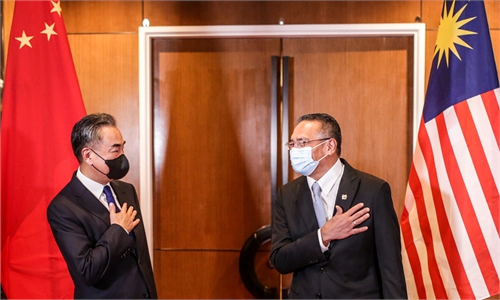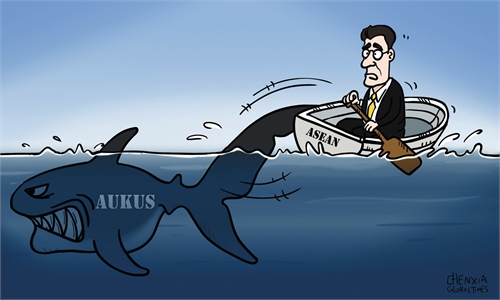ASEAN members bicker over AUKUS
Conflict over pact exposes Washington’s naivety of forming alliance in region to counter China: analysts

Leaders of the Association of Southeast Asian Nations (ASEAN) meet at the ASEAN Secretariat Building in Jakarta in April. Photo: VCG
The new tripartite defense alliance AUKUS, formed with the intention of intimidating China, will strain ASEAN's unity and integration as regional countries are divided over the pact, experts said Wednesday, noting that if it sparks an arms race, it threatens to destabilize the region.
Faced with the looming danger of geopolitical imbalance and being dragged into unpleasant position of choosing between two superpowers, ASEAN members are eager to reach a consensus on how to deal with the pact. Yet experts said that no matter what position the bloc chooses to take collectively, it will gradually see the US, the culprit of breaking the regional balance, as a "major troublemaker." It should dawn on Washington that the bickering and divergence over AUKUS indicates how difficult and na?ve it is to form an alliance in the region against China.
Speaking at the Sixth Meeting of the Ministers of Foreign Affairs of the Conference on Interaction and Confidence Building Measures in Asia via video link on Tuesday, State Councilor and Foreign Minister Wang Yi urged Asian countries to "see through the nature of the AUKUS trilateral security partnership and the US Indo-Pacific Strategy and jointly oppose any attempt that violates the common will of regional countries and sabotages regional peace and stability."
AUKUS, the trilateral security partnership, was formed in mid-September by Australia, the UK and the US. It includes an agreement to enhance Australia's defense capacity through technology transfer of nuclear-powered submarines and other underwater capabilities. It is largely seen as a US effort to ally the other two to contain China in Southeast Asia.
The plan has divided countries in Southeast Asia, with Indonesia and Malaysia warning that it could lead to an arms race among rival superpowers in the region, while the Philippines, a US defense ally, has backed the pact.
The upcoming ASEAN Defense Ministers Meeting (ADMM) retreat next month will be an important platform to strengthen regional defense cooperation in light of the controversial AUKUS, Malaysian media The Star reported.
Malaysia's Defense Minister Hishammuddin Hussein told parliament on Tuesday a meeting with his counterparts from ASEAN scheduled next month will present an opportunity for the bloc to agree on a shared response to AUKUS.
"Our endgame as always is to ensure the region's stability, regardless of the balance of powers [between] the US or China," he said.
Indonesia does not want an escalating arms race and power projection in the region that will threaten security and stability, Indonesian Foreign Minister Retno Marsudi said in late September, after the signing of AUKUS.
The Philippines has publicly voiced support. In a statement on October 6, the country's Department of Foreign Affairs said that Acting Undersecretary for Bilateral Relations and Asean Affairs Theresa Lazaro echoed the earlier statement of Secretary Teodoro Locsin Jr. that the Philippines "sees value in the enhancement of a neighbor's capability to project power."
The first multilateral security pact in the Indo-Pacific region for nearly three decades, AUKUS is proving an ordeal for ASEAN's unity, and may further deepen the cracks between the bloc, Chen Xiangmiao, an assistant research fellow at National Institute for South China Sea Studies, told the Global Times.
Differing in security strategies, varied needs and dependence on US security protection and cooperation, along with diverse recognition of China's "security threats," have resulted into different reactions toward AUKUS, said Chen, predicting that it will be extremely difficult for ASEAN to reach consensus about AUKUS. Their divided stance on the pact will deter the security and political integration of the bloc, or even pose a challenge to the realization of the ASEAN political-security community blueprint 2025.
Chen said that compared with the EU, ASEAN's political and security integration is still in its infancy, hence bloc members rarely seek "collective safety," but rather depend on themselves to build defense capabilities. "The dangers of Australia whose military power has been elevated by AUKUS will throw ASEAN members into a new round of arms race," Chen said.
When speaking to foreign ministers of Malaysia and Brunei in September, Wang Yi stressed five dangers of AUKUS, which include creating a nuclear proliferation risk, causing another round of arms race and posing a real threat to regional countries.
'Regional troublemaker'
Experts warned that the forming of AUKUS may turn ASEAN members back against the US, as they see Washington as a "major troublemaker" in the Indo-Pacific region.
If the project is implemented, Australia will become the seventh country in the world to have nuclear submarines, after the US, Britain, France, China, India and Russia.
Koh King Kee, president of the Center for New Inclusive Asia in Malaysia, told the Global Times previously that the pact is an obvious challenge to the spirit of the Treaty of Southeast Asia Nuclear Weapon-Free Zone (SEANWFZ or Bangkok Treaty), which is committed to keeping nuclear weapons out of the region.
Many have expressed the view that after acquiring nuclear-powered submarines, it is likely Australia will further seek to acquire nuclear weapons in the future, he said.
Malaysia and Indonesia have expressed legitimate concerns about the AUKUS deal. It raises fundamental concerns about whether or not this violates the nonproliferation regime, Kishore Mahbubani, Singaporean political scientist and distinguished fellow at the Asia Research Institute, National University of Singapore, told the Global Times during an exclusive interview.
The best way to answer this question is to ask whether AUKUS members would object to Iran acquiring nuclear submarines. If Iran acquiring nuclear submarines is against the nonproliferation regime, does this mean all other countries should also not acquire nuclear submarines?
Experts said that AUKUS has dragged Southeast Asian countries into an unpleasant position where they have to take sides between China and the US.
Singapore's Foreign Minister Vivian Balakrishnan said last week that Southeast Asia wants peace and prosperity, reiterating a long-time stance that countries are against being forced to take sides in the US-China rivalry.
"We do not want to become an arena for proxy contests or even conflict," he said.
Although the US has constantly assured ASEAN members that it will not force them to take a stance, the forming of AUKUS has proved that US promises are hypocritical, said Chen, explaining that ASEAN members' key geographic position means they will inevitably become embroiled in the rivalry.
The bloc has learned from its traumatic history that turbulence and conflict can only bring damage to its development, said Chen, noting that the region is increasingly seeing the US, which is obsessed with marshalling allies in the Indo-Pacific region more as a "destabilizer and troublemaker," rather than a "protector."
"Moreover, the bickering and conflicts of ASEAN members over AUKUS should teach Washington a lesson about how difficult and na?ve it is for it to form an alliance against China in the Indo-Pacific region," Chen said.




